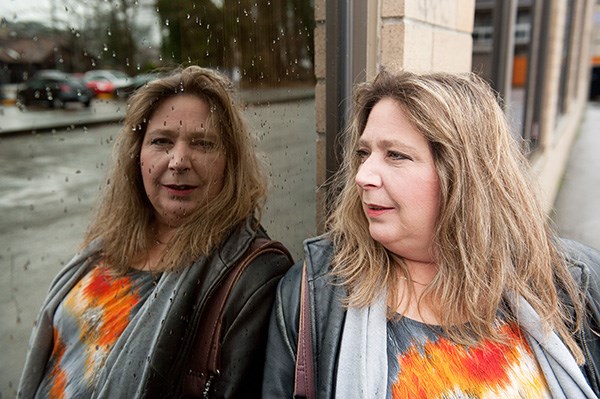Squamish’s Amanda Schell could write a stack of books from the various perspectives she has seen mental illness.
Schell, 45, has lived through psychotic depression, which began when she was about six years old and lasted well into adulthood.
Today, she is a highly functioning professional who helps others with their mental health issues. Schell co-ordinates Vancouver Coastal Health’s peer support-worker program for the Sea to Sky Corridor, and she works as an outreach worker for Squamish Mental Health and Addiction Services.
Schell also knows what it is like to be the family member of a person with mental illness. Her adult son was diagnosed with a psychotic disorder in 2007.
“I did a lot of blaming myself that I passed this down to him, even though
is not my fault, it is genetic,” Schell said.
One in four people will experience a mental illness at some point in their lives, Schell said, and almost everyone knows someone who has had a mental illness.
Families are also affected. More than one million working Canadians take care of a person diagnosed with a mental illness, according to the Canadian Mental Health Association.
“So there isn’t anyone who isn’t affected by this,” Schell said.
Families need to understand mental illness in order to help and cope. A common misconception family members may have is that a mental disorder is a weakness, but “that isn’t the case. It is a bio-chemical disorder in the brain,” said Schell.
Some of the difficulty for families, at least early on in the journey of mental illness of a loved one, is that symptoms can be attributed to many different things, so trying to figure out the difference between mental illness and typical behavior can be confusing. Mental illness often manifests in adolescence so symptoms can be easily mistaken for rebellion.
The best thing family members can do, which Schell said would have helped her when she was a child dealing with hallucinations, is to ask questions.
“They kind of passed it off as, ‘she is going through a phase’ or ‘this is normal, typical kid behaviour,’ and they didn’t really ask the right questions to find out what was going on,” she said.
“If you see real changes in their personality, if they are withdrawing, if they are not able to sleep, if there are high fears and phobias and that sort of thing, I would definitely be concerned,” she said.
The first line of defence is the family doctor, according to Schell.
For family members of adults living with mental illness, respect is important.
“A lot of the times a family member will say something that makes the person feel like they are being treated like a child when they are really an adult,” Schell said.
“We really need to give that power back to them in order for them to heal.”
Schell said there is still a lot of stigma and stereotyping around mental illness that leads to fear.
With schizophrenia in particular, Schell said, the media has a lot to do with the stigma because the news often focuses on the mentally ill person who was aggressive or who did something criminal, when for the vast majority of people with the disorder that does not happen.
“I think it is so easy to make the story interesting when there is a mental illness attached to it, which adds to the stigma,” she said.
The key is keeping the topic of mental illness in the spotlight aided by honest dialogue and support.
“It was kept in the shadows for so long,” she said. “It is just a matter of keeping that conversation going and opening those invitations to have those conversations until it becomes the norm,” Schell said.
A free 12-session course put on by the North Shore Schizophrenia Society, called Family-to-Family, for Squamish friends and families dealing with serious mental illness begins Feb. 24 at Sea to Sky Community Services. For information and to register, call 604-926-0856.



